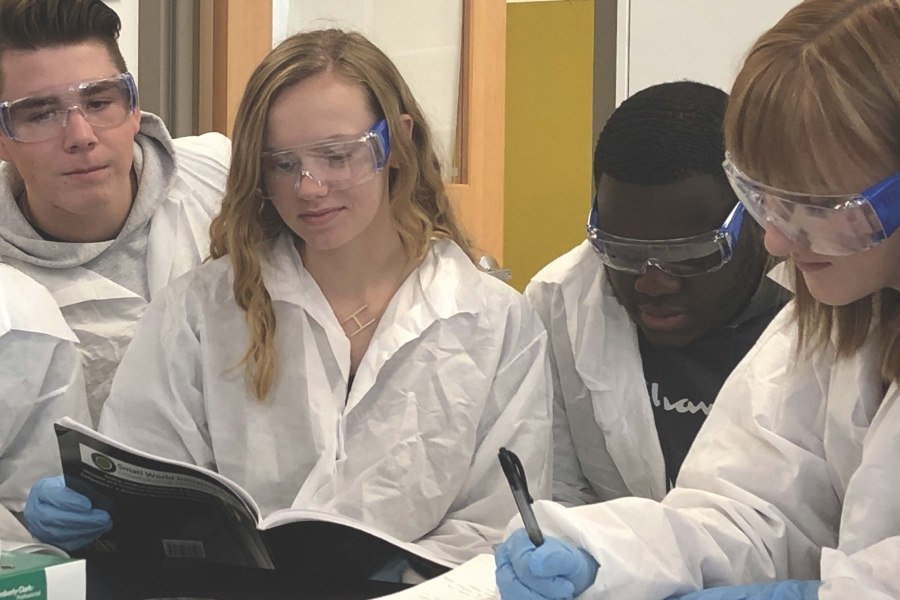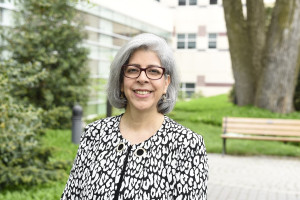La Salle University, Merck Partner to Prepare Students for Careers in Life Science Industry
With an innovative curriculum developed by Pathway for Patient Health, the partnership offers faster paths to careers in the rapidly expanding sector.

La Salle University students in the lab. ” Courtesy photo
La Salle University and multinational pharmaceutical giant Merck have teamed up with Pathway for Patient Health to offer a suite of new courses aimed at preparing undergraduate students for careers in the life science industry.
The new partnership will give students access to education and training opportunities specific to careers in the pharmaceutical, medical device, biotech, animal health and consumer goods industries during their undergraduate studies — experiences that are typically reserved for graduate students or early-career professionals.
“That’s where a lot of the value lies for students,” said David Zuzga, associate professor and chair of the department of biology at La Salle. “It’s accelerating their professional development.”
According to Zuzga, La Salle’s biology program attracts many students who have an interest in healthcare but often come into college with a very narrow view of their future career options.
“Like seeing the tip of an iceberg, students usually see front line caregivers — physicians, physician assistants, and nurses — but they have very little understanding of the much broader life sciences, biomedical and pharmaceutical industries that support those caregivers and ultimately provide the tools to ensure and protect patient health,” Zuzga added.
The partnership is designed to increase students’ exposure to these career options and enhance their readiness to enter the biopharmaceutical industry through immersion in industry-relevant science education and real world experiences. It’s all part of the Quality Science Education Program (QSE) developed by Pathway for Patient Health president and chief executive officer, Marla Phillips.
The QSE is a cooperative education program that is offered free of charge to universities around the world. The program includes a curriculum developed by leaders in the life science industry and government that is audited against criteria established by the Pathway for Patient Health Advisory Board which includes executives from leading companies in the life sciences, including AstraZeneca, Eli Lilly, GlaxoSmithKline, and others. The program is currently being offered at ten other universities across the United States and Ireland, including Harvard, the University of Southern California and Technological University in Dublin. La Salle is the first to offer the program in the tri-state area.
According to Phillips, the program includes five courses that the industry has identified as being important for entry-level roles in the life sciences.
“If we could have students understand why we do what we do to protect patient safety and to ensure product quality, they would be equipped to enter our industry one to three years ahead of the game,” she said. “These courses aim to do that.”
Students enrolled in QSE courses will also be connected to industry recruiters through the Pathway Portal, a web-based platform that assists students in securing paid-internships and employment opportunities.
La Salle’s implementation of the QSE program is made truly unique by the fact that the courses are taught by a team of 12 industry experts from Merck who volunteer their time and expertise free of charge.
Anil Sawant, Merck’s vice president of global quality management systems and external affairs says volunteerism is ingrained in the culture at Merck, so he had no trouble finding employees who were willing to participate in the program at La Salle.
“We volunteer countless hours because that’s something that Merck encourages us to do. Typically we volunteer our time with nonprofits, but we saw this as a tremendous opportunity to give back to the community and volunteer our time doing what we love doing,” said Sawant. “In return, we get energy and engagement from the students and the satisfaction of knowing we’re doing the right thing for society.”
The first course in the QSE curriculum, Global Regulatory and Legal Requirements in the Biotech/Pharmaceutical Industry, kicked off this spring at La Salle. The course, which is held once per week in the evening, focuses on why global regulations were adopted and the evolution of industry quality systems.
Jenna Soriano, a junior at La Salle with a double major in biology integrated science and business, says she, like many other students majoring in science, is not sure of the specific career she’d like to pursue when she graduates in 2021. But the QSE program has begun to open her eyes to possibilities she hadn’t considered before.
“The cool thing about this program is you make a lot of connections with people and you can possibly get internships, which makes you want to try new things,” Soriano said. “I’ve been considering working in the lab and this has helped me figure out what interests me and what I’d like to do with my life. I think it’s awesome that it’s being offered in undergrad because it helps us visualize how this work goes into real life and can actually affect patients, which I think is really neat.”


